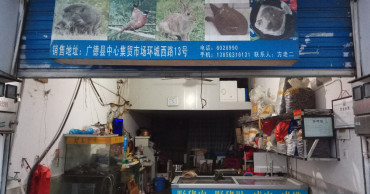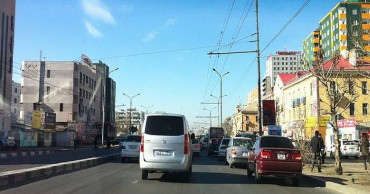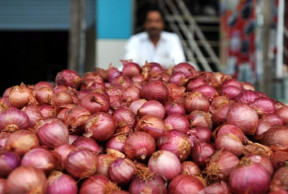bans
‘Day by day’: Trade bans, inflation send food prices soaring
Soki Wu’s food stall, tucked in a food court in a shopping mall in Singapore, is a crowd favorite for its fresh, juicy “chicken rice,” a national dish. But customers recently began complaining that his chicken didn’t taste quite as good as it used to.
Wu was forced to switch to frozen chicken after Malaysia banned exports last month of live broiler chickens that are more affordable and better tasting in a bid to offset rising local prices. For Singapore, which sources a third of its poultry from Malaysia, the impact was immediate.
“This is unavoidable. Using frozen chickens have affected the taste of the dish, but we have no choice,” Wu said.
As inflation surges around the world, politicians are scrambling for ways to keep food affordable as people increasingly protest the soaring cost of living. One knee-jerk response has been food export bans aimed at protecting domestic prices and supplies as a growing number of governments in developing nations try to show a nervous public that their needs will be met.
For business owners, the rising cost of cooking ingredients — from oil to chicken — has prompted them to raise prices, with people paying 10% to 20% more at Wu’s food stall. For consumers, it has meant paying more for the same or lesser-quality food or curbing certain habits altogether.
In Lebanon, where endemic corruption and political stalemate has crippled the economy, the U.N. World Food Program is increasingly providing people with cash assistance to buy food, particularly after a devastating 2020 port blast that destroyed massive grain silos. Constant power cuts and high fuel prices for generators limit what people can buy because they can’t rely on freezers and refrigerators to store perishables.
Tracy Saliba, a single mother of two and business owner in Beirut, says she used to spend around a quarter of her earnings on food. These days, half her income goes to feeding her family as the currency loses strength amid soaring prices.
Read: G20 finance leaders in Bali to tackle Ukraine, inflation
“I’m not buying (groceries) like I used to,” Saliba said. “I’m just getting the necessary items and food, like day by day.”
Food prices have risen by nearly 14% this year in emerging markets and by over 7% in advanced economies, according to Capital Economics. In countries where people spend at least a third or more of their incomes on food, any sharp increase in prices can lead to crisis.
Capital Economics forecasts that households in developed markets will spend an extra $7 billion a month on food and beverages this year and much of next year due to inflation.
The pain is being felt unevenly, with 2.3 billion people going severely or moderately hungry last year, according to a global report by the World Food Program and four other U.N. agencies.
Food prices accounted for about 60% of last year’s increase in inflation in the Middle East and North Africa, with the exception of oil-producing Gulf countries. The situation is particularly dire for Sudan, where inflation is expected to hit 245% this year, and Iran, where prices spiked as much as 300% for chicken, eggs and milk in May, sparking panic and scattered protests.
In Somalia, where 2.7 million people cannot meet their daily food requirements and where children are dying of malnutrition, sugar is a source of energy. In May, a kilogram (2.2 pounds) of sugar cost about the equivalent of 72 cents in Mogadishu, the capital. A month later, it had shot up to $1.28 a kilogram.
“In my home, I serve tea (with sugar) three times a day, but from now on, I have to reduce it drastically to only making it when guests arrive,” said Asli Abdulkadir, a Somali housewife and mother of four.
People there are bracing for even higher costs after India announced it would cap sugar exports this year. Even if that doesn’t reduce India’s sugar exports compared with previous years, news of the restriction was enough to cause speculation among traders like Ahmed Farah in Mogadishu.
“The cost of sugar is expected to surge since Somalia counts heavily on the white sugar exported from India and a few brown sugars from Brazil,” he said.
Also read: US inflation surges again in June, raising risks for economy
Food export restrictions aimed at protecting domestic supplies and capping inflation is one reason for the rising cost of food.
Food prices had been steadily climbing worldwide because of drought, supply chain issues, and high energy and fertilizer costs. The U.N. Food and Agriculture Organization says food commodity prices were up 23% last year.
Russia’s war in Ukraine further sent the price of wheat and cooking oils up, fueling a global food crisis. There was a breakthrough this week to create safe corridors for Black Sea shipments, but Ukrainian ports have been blocked from exporting these key goods for months and it will take time to get them moving again to vulnerable countries worldwide.
There’s concern that the impact of all these factors will lead more countries to resort to food export bans, which are felt globally. When Indonesia blocked the export of palm oil for a month in April, palm oil prices spiked by at least 200%.
Analysts say food export bans are shortsighted because they have a domino effect of driving up prices.
“I would say that roughly 80% of the bans we see are ill-advised — a kind-of, sort-of gut reaction by certain politicians,” said David Laborde, who is credited with creating a food trade policy tracker at the International Food Policy Research Institute.
“In the world where you will be the only one to do it, that can make sense,” he said. “But in a world where other countries can also do it, actually that’s far from being a good idea.”
Laborde said bans are “a very selfish policy ... because you try to get better by making things worse for others.”
The list of food export restrictions Laborde has been tracking since the COVID-19 pandemic is long and changes constantly. Examples of their impact include Kazakhstan’s restrictions on grains and oil on prices in Uzbekistan, Tajikistan, Turkmenistan and Afghanistan; Cameroon’s rice export restriction on Chad; and Tunisia’s fruit and vegetable restrictions on Libya.
In Singapore, 29-year-old Wu is hopeful he can keep the family business running as Singapore’s government signed off on Indonesia as a new chicken supplier.
“Things will get better,” he said. “(This) will only make us more resilient.”
3 years ago
DMP bans carrying of arms, gathering around JS
Dhaka Metropolitan Police (DMP) has imposed ban on carrying all kinds of weapons, explosives, other harmful substances and holding rallies around the Jatiya Sangsad from Saturday midnight ahead of the 16th session of the 11th Parliament
The 16th session of the 11th Parliament will begin Sunday.
READ: 2 restaurants fined Tk 1.5 lakh in DMP drive
DMP imposed the restrictions to ensure undisrupted movement during the parliament session, said a notification signed by DMP Commissioner Mohammad Shafiqul Islam.
The roads and areas under restrictions are: From Mohakhali crossing on Mymensingh Road to Banglamotor Crossing via Old Airport, from Banglamotor Link Road to Hotel Sonargaon Road to SAARC Fountain, from the eastern end of Panthapath to Farmgate via Green Road link road, From Shyamoli crossing to junction of Dhanmondi-18 (old-27) road, from Rokeya Sarani link road to old 9th division crossing to Bijoy Sarani Parjatan crossing, from the east end of Indira road to west end of Manik Mia Avenue, the restricted area of the Jatiya Sangsad and all the roads and lanes in the area.
READ: No outdoor celebration on 31st night: DMP
The restrictions will be in force till the parliament session ends.
4 years ago
State mask bans face federal civil rights inquiries
The Education Department announced Monday that it’s investigating five Republican-led states that have banned mask requirements in schools, saying the policies could amount to discrimination against students with disabilities or health conditions.
The department’s Office for Civil Rights sent letters to education chiefs in Iowa, Oklahoma, South Carolina, Tennessee, and Utah. Those states have barred schools from requiring masks among all students and staff, a move that the department says could prevent some students from safely attending school.
“It’s simply unacceptable that state leaders are putting politics over the health and education of the students they took an oath to serve,” Education Secretary Miguel Cardona said in a statement. “The department will fight to protect every student’s right to access in-person learning safely.”
It marks a sharp escalation in the Biden administration’s battle with Republican states that say wearing masks should be a personal choice. President Joe Biden last week asked Cardona to explore possible legal action, prompting the department to examine whether the policies could amount to civil rights violations.
The state policies conflict with guidance from the Centers for Disease Control and Prevention, which recommends universal mask wearing for students and teachers in the classroom.
If the investigations determine that the state mask bans have discriminated against students with disabilities, it could lead to sanctions including a loss of federal education funding.
READ: US civil rights leader urges Biden To give 60 million Covid-19 vaccine doses to India
The department said it has not opened investigations in other states where mask bans have been overturned by courts or are not being enforced, including in Florida, Texas, Arkansas and Arizona. But the agency said it is “closely monitoring” those states and is prepared to take action if necessary.
The investigations aim to determine whether state mask bans amount to a violation of students’ right to a free, public education. The department is raising concerns that, in areas with high COVID-19 transmissions, the bans could discriminate against students who are at heightened risk for severe illness.
READ: Muslim civil rights group sues Facebook over hate speech
The department is launching the investigations at its own discretion and not in response to complaints from parents, but Cardona said families have raised concerns that mask bans could put children with disabilities or health conditions at risk.
4 years ago
China temporarily bans wildlife trade in wake of outbreak
Chinese authorities announced a temporary ban on the trade of wild animals Sunday following a viral outbreak in Wuhan, saying they will "severely investigate and punish" violators.
6 years ago
Germany bans neo-Nazi organization Combat 18 Deutschland
Germany is banning the neo-Nazi group Combat 18 Deutschland in what the country's top security official said Thursday was a "clear message" against far-right extremism and anti-Semitism.
6 years ago
Mayor of Mongolia's capital bans use of official cars for private purposes
Mayor of Mongolia's capital Ulan Bator Sainbuyan Amarsaikhan has banned the use official cars for private purposes, the mayor's press office said Tuesday.
6 years ago
Indian govt bans export of onions
Dhaka, Sept 29 (UNB) – The Indian government on Sunday banned the export of onions with immediate effect till further orders for what it says improving domestic availability.
6 years ago
IU bans procession, meeting on campus for 24 hrs
Islamic University, Sept 21 (UNB) – The authorities of Islamic University in Kushtia on Saturday imposed a one-day ban on processions and meetings on the campus.
6 years ago
.jpg)
.jpg)
.jpg)









